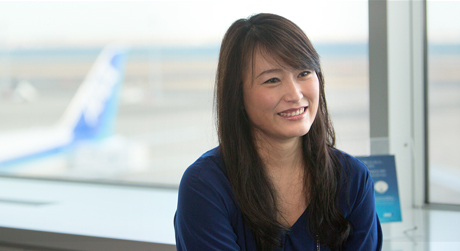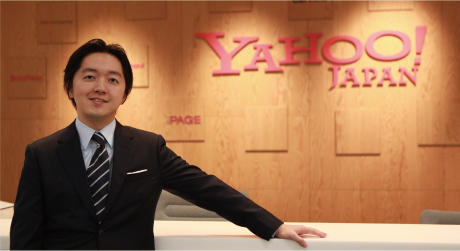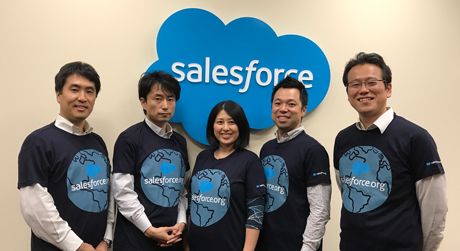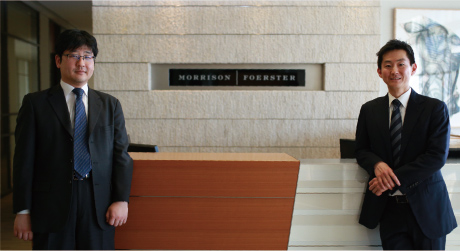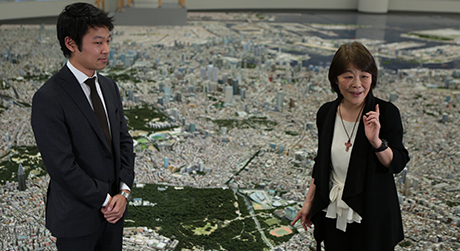SPONSOR INTERVIEWSOur shared vision drives creative partnerships for global health innovation
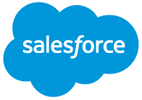
-
salesforce.com Co.,Ltd.
Keisuke Ueda
Non Profit Sales Account Executive
Toshikazu Watanabe
Service Cloud Specialist
Solution Engineering
-
Rie Endo
Director
Salesforce.org
Ken Wakamatsu
Product Management Director
Masahiro Ishijima
Lead Solution Engineer
Solution Engineering
“We have been taking a two-track approach with the goal of growing and enhancing both our business and our contribution to society”
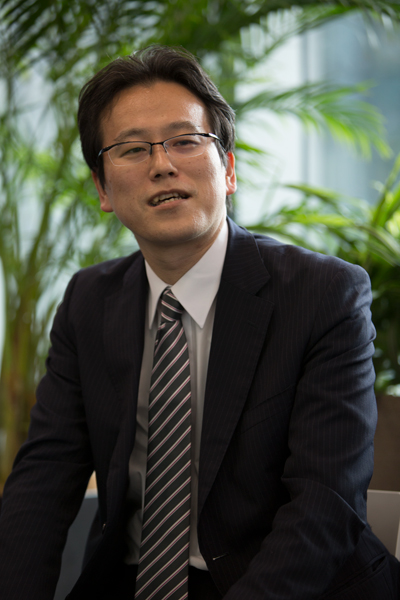
Mr. Masahiro Ishijima
A two-track approach: core business and social contribution
Wakamatsu: Salesforce was established in San Francisco in 1999, and the Japanese subsidiary was founded in 2000. Salesforce is still eighteen years old and relatively young. We offer a cloud-based CRM services that leverage social, mobile, and AI technologies, enabling personalized engagement and communication to help companies effectively connected with their customers.
Endo: We launched Salesforce.org, the philanthropic arm of Salesforce, in 1999 and have been taking a two-track approach with the goal of growing and enhancing both our business and our contribution to society. It was important to us to provide support as a member of the community from the beginning, rather than starting these activities after the company had grown or waiting until the business had become profitable. Based on our "1-1-1 model” (to improve communities around the world through our people, technology, and resources), our employees contribute 1% of their working hours to social contribution activities. Such activities include the volunteer activities and the provision of our technology and strategic financial investment to other NPOs. We support a wide range of organizations, with approximately 31,000 NPOs and educational institutions currently using our products. Our activities vary from organization to organization, including educational support, support for the elderly, and provision of solutions to address environmental problems.
Ueda: To be more specific, we mainly provide CRM tools to NPOs, public interest incorporated associations, public interest incorporated foundations, social welfare corporations, religious institutions, and institutions for rehabilitation of offenders. The use of the tools varies depending on each organization, from event and accounting management to form control. Usually, Salesforce services are used to manage donations, contributors, and membership.
Endo: We foster equality by, for example, helping eliminate educational inequities through educational support as well as by providing career guidance/education for young people. We believe that it is our responsibility as a company to make a meaningful contribution to society, and that it is a great honor that our technology can help address social problems.
“We would be truly happy if the organizations can expand their activities by using various products and platforms comprehensively and effectively.”
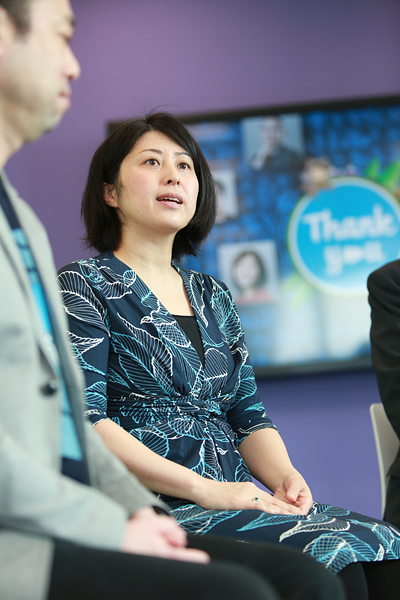
Ms. Rie Endo
Making the most of our expertise
Endo: We refer to the Salesforce culture as “Ohana”, which means “family” in Hawaiian. We consider our employees, customers, partner companies, NPOs, and other stakeholders related to our business as Ohana. Based on this culture, all employees are involved in volunteer activities; 10% of volunteer hours are pro bono. We plan to increase the number of pro bono programs in order to make the best use of our employees' skills and expertise—in law, finance, human resources, and other fields—for recipient organizations. Notably, three of our employees are currently providing pro bono support to the GHIT Fund. Another example of this work is our pro bono support to children outside Japan who wish to attend public high schools in Japan; this program includes helping students prepare for interviews and helping them write personal statements. Finally, we have another initiative that offers mentorship for young people to help them secure full-time employment.
Watanabe: Before working at Salesforce, I hadn't seen any company incorporate employee volunteer activities into its core business model. By contrast, Salesforce actively encourages us to engage in pro bono activities, and I have had many opportunities to try different things. I am pleased to be able to support NPOs as a pro bono volunteer by making full use of my technical experiences, such as system implementation and operational methods. In addition, I admire the passion and thought process of the members of NPOs as I listen to their stories. I do not get to hear such stories very often; they help me think more seriously about how I can contribute to society in the future.
Growing through pro bono work
Endo: For someone whose job is to promote pro bono works, it is a great pleasure to hear employees talk about their positive experiences working pro bono, as well as what they have gained through their engagement. It is clear that these works make a positive impact on the company. For example, our pro bono works give us opportunities to see and think about our products from a more intimate customer perspective. This helps us continuously improve our services and communicate more effectively with our business partners. Pro bono works may seem like something only people with very advanced experience and skills can perform, but it also has a positive impact on those in junior positions. For example, junior colleagues can improve their skills by working with senior colleagues on pro bono projects to gain experiences in project management and leadership. So rather than being arrogant, thinking that we are only doing good for others, we have to be thankful to have this great opportunities to grow through these activities.
Ueda: I am in charge of sales, and I learn a great deal every day from many NPOs. Since each organization works on different issues and tasks, when I have appointments with, say, three organizations in a day, I find it challenging as the services to be offered to each of them are quite varied. At the same time, I am reminded of the breadth and depth of social problems in the world. It is also very rewarding in the sense that we can make use of what we learn from an NPO to provide better proposals and feedback to our customers in other organizations and business situations. For example, discussions with GHIT on what kinds of system our products could offer made us realize that our products are capable of covering a wider range of services than we had thought, and that they could contribute greatly to the operational improvement of NPOs as a result. I am sure that other employees are also learning a lot from NPOs through their pro bono activities.
Watanabe: Private sector enterprises must make profits. We develop strategies to improve customer satisfaction and experience in order to increase profits, as well as sales, over the long term. I respect and understand the bottom-line focus, and I appreciate the opportunity to also help GHIT improve global health (their bottom line) through my pro bono works.
Ishijima: Many of our customers are large corporations. Their contributions to society as tax payers and employers are critically important; these contributions vary according to the respective social and corporate values of each company. These are indirect contributions, though. By contrast, NPOs often make a more direct impact on society; through our works with them, we can also make a direct contribution—with our technology and our experience. The opportunity to get involved in these works makes Salesforce as a stand-out employer. In my previous jobs, I was never able to become deeply engaged in the activities so concretely linked to social good.
Ueda: Some of our products have specific benefits and price structures for NPOs, such as our Lightning Enterprise Edition and Community Cloud. However, our greatest contribution to NPOs is that our highly skilled, experienced, and motivated employees are involved in pro bono activities. In the case of the GHIT, Wakamatsu provides product development expertise, and Ishijima and Watanabe have helped GHIT conduct a major core system analysis to increase operational efficiency and lay the groundwork for institutional expansion.
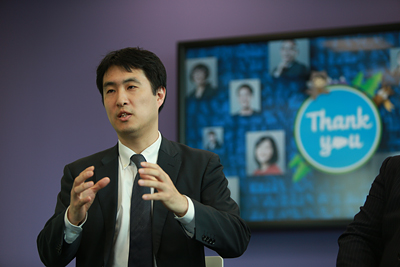
Mr. Keisuke Ueda
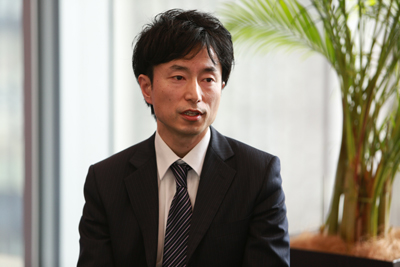
Mr. Toshikazu Watanabe
“We would like to become a trusted partner of the GHIT Fund over the next five years. We hope to engage more deeply in helping GHIT achieve its goals and address its challenges, and we would like to be able to grow and improve together by improving our products to meet those challenges.”
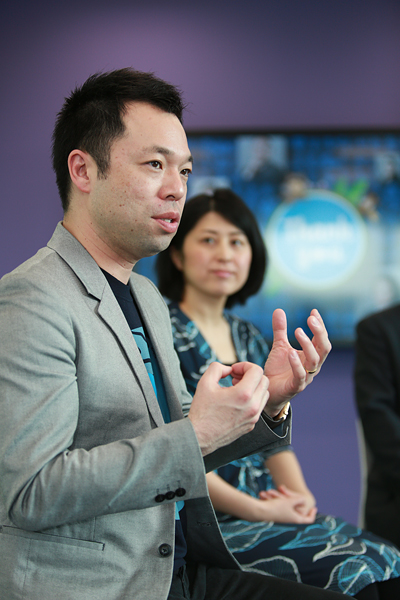
Mr. Ken Wakamatsu
What makes the GHIT unique
Endo: In addition to its Japanese identity, one of GHIT's advantages is that it involves a large number of companies. I get the impression that the partners involved are working on their own initiative rather than in response to requests from GHIT. In my opinion, success for an industry–government–academia partnership relies on a mutual awareness of, and appreciation for, one another's respective contributions. In this way I think we can set an example for other social movements, and that is precisely why it is important that Salesforce participate as a GHIT sponsor.
Additionally, I strongly agree with GHIT's use of the term "investment" rather than "grant" to refer to their financial support for research and development. The use of the term will allow the researchers to see the funds in a completely different way. Those receiving funds recognize that they are much relied upon for the future, possibly giving them a renewed desire to change the world. They will also engage in undertakings that are more advanced and interesting in many ways. I hope GHIT continues to evolve as a truly wonderful example of an industry-government-academia partnership.
Salesforce × GHIT
Wakamatsu: There are many areas that we can work to make the current GHIT data management system better. We believe that we can help the organization grow further by using our technology to organize information and processes more efficiently, and we are looking forward to that. GHIT will be able to manage data on Salesforce and adopt deep learning, even integrating AI technology in the future. Furthermore, by using these technology, exclusive data model for GHIT might be developed to store investment management information in the future. The data can be analyzed by humans, but it will also become possible to offer analysis services using AI.
We would like to become a trusted partner of the GHIT Fund over the next five years. We hope to engage more deeply in helping GHIT achieve its goals and address its challenges, and we would like to be able to grow and improve together by improving our products to meet those challenges.
Ueda: GHIT's fundraising efforts will be enhanced by thorough, accurate analysis of its financial management. As the fund grows, GHIT's activities will expand, increasing its institutional capabilities and prowess. I think that this is where our technology can best contribute. Actually, NPO communities in Japan are still relatively small. There are more than 31,000 organizations using our products globally, but since we only have less than 1,000 users in Japan, there are not many significant cases in the NPO sector. With this reason, I personally would be truly happy if the organizations can expand their activities by using various products and platforms comprehensively and effectively. As their trusted partner, we would like more people to get involved in our pro bono activities and achieve success by working with us.
The affiliations and positions listed in this interview are at the time of publication of the interview in 2017.
- Biography
-
Keisuke Ueda
Non Profit Sales Account Executive
Toshikazu Watanabe
Service Cloud Specialist
Solution EngineeringRie Endo
Director
Salesforce.org -
Ken Wakamatsu
Product Management Director
Masahiro Ishijima
Lead Solution Engineer
Solution Engineering


